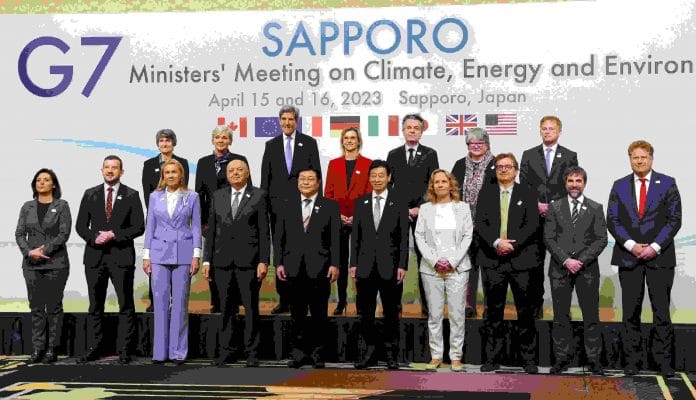New Delhi: Climate and energy ministers of Group of Seven (G7) pledged to try to accelerate the transition to cleaner renewable energy, but offered no schedule to completely phase out coal-fired power plants as they concluded two days of meetings in Sapporo in northern Japan.
In a 36-page communiqué Sunday that outlines their pledges, the ministers stressed the importance of reducing carbon emissions swiftly and feasibly and achieving a “predominantly decarbonised power sector” by 2035. They also promised to accelerate the “phase-out of domestic unabated coal power” and emphasised the need to reduce global greenhouse gas emissions by around 43 per cent by 2030 and 60 per cent by 2035 in light of the most recent report by the Intergovernmental Panel on Climate Change (IPCC).
Despite their pledge, they didn’t agree to a proposal to fully phase out coal by 2035.
“Recognising the current global energy crisis and economic disruptions, we reaffirm our commitment to accelerating the clean energy transition to net-zero greenhouse gas (GHG) emissions by 2050 at the latest,” the communique said, adding that it also includes cutting down on gas as a primary response to the energy crisis and an expansion of solar and offshore wind.
The statement sets tone for climate change debates for the rest of the year, starting with the 2023 G7 Summit in Hiroshima in May.
Meanwhile, Japan received G7’s support for its own national policy emphasising clean coal, hydrogen, and nuclear energy to help secure its energy security.
‘De-carbonised power sector by 2035’
The leaders stressed the importance of ensuring the supply of essential minerals, which are used in many high-tech goods, comply with high social and environmental standards.
Although the ministers promised to “fully” or “predominantly” decarbonise their power sector by 2035, they didn’t agree to the UK’s and Canada’s proposal to phase out coal by 2030.
The “predominantly” qualifier is being seen as a direct outcome of Japan’s failure to implement more ambitious domestic power sector decarbonisation plans.
Among those opposing the suggestion to fully phase out coal were Japan, the United States, and the European Union. Instead, ministers decided that no new coal power plants should be built either within G7 countries or globally.
In his address at the G7 meeting, Bhupender Yadav, India’s Minister for Environment, Forest and Climate Change, said conserving and restoring ecosystems could help decrease the extent of climate change and manage with its consequences. It’s critical to address climate change challenges “in tandem with environmental action”.
“Climate change, desertification, and biodiversity loss are inextricably intertwined and represent existential threats to humanity,” Yadav said.
In response to these problems, he added, the Rio Conventions have made “great progress through a consensus-driven, principles-based approach”.
“India’s G20 presidency, for example, has taken this approach which promotes a sustainable and climate-resilient blue economy, as well as resource efficiency and a circular economy, with Lifestyle for Environment (LiFE) as a cross-cutting theme, thus mainstreaming climate change and addressing its impacts in an ambitious, decisive, and action-oriented manner,” he was quoted as saying by a government press release.
‘Scaling down emissions’
The G7 countries are responsible for 40 per cent of worldwide economic activity and a quarter of global carbon emissions.
Sultan Al Jaber, the president-designate for the next United Nations climate meetings, or COP28, who was also in Sapporo, released a statement urging G7 nations to extend financial support to developing countries’ renewable energy transitions.
Addressing the Joint meeting of G7 Ministers of Climate, Energy and the Environment, Al Jaber said the world was falling behind on its climate commitments.
“To get where we need to go, everyone must pull in the same direction,” said Al Jaber, who is also the UAE’s Minister of Industry and Advanced Technology. “We must replace polarisation with partnership, division with determination. That’s why I am calling for a COP of action, a COP of unity, a COP of solidarity, and a COP for all. We must act together to ignite a transformational agenda that is pro-growth, pro-climate and leaves no one behind.”
On the other hand, India asked developed nations to scale down their emissions to allow developing countries to push for “development”.
In a tweet on 15 April, Yadav said that “the IPCC AR 6 Report reemphasises that development our best defence against climate change”.
“The global goal of reaching net-zero by 2050 needs enhanced emission descaling by developed nations,” he said. “This will provide space for countries like India to achieve the development required for its people, which will provide necessary defence against the impacts of climate change, environmental degradation and pollution.”
(Edited by Uttara Ramaswamy)
Also Read: Between China, climate change & development, Ladakhi nomads are losing grip on their land






